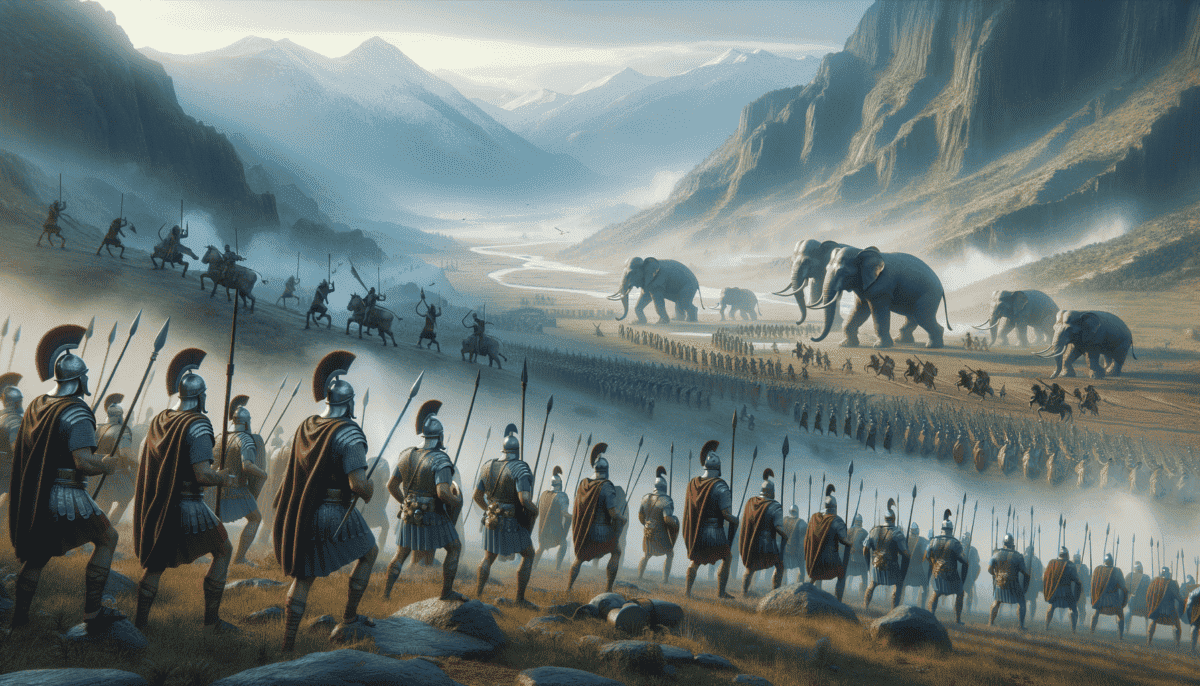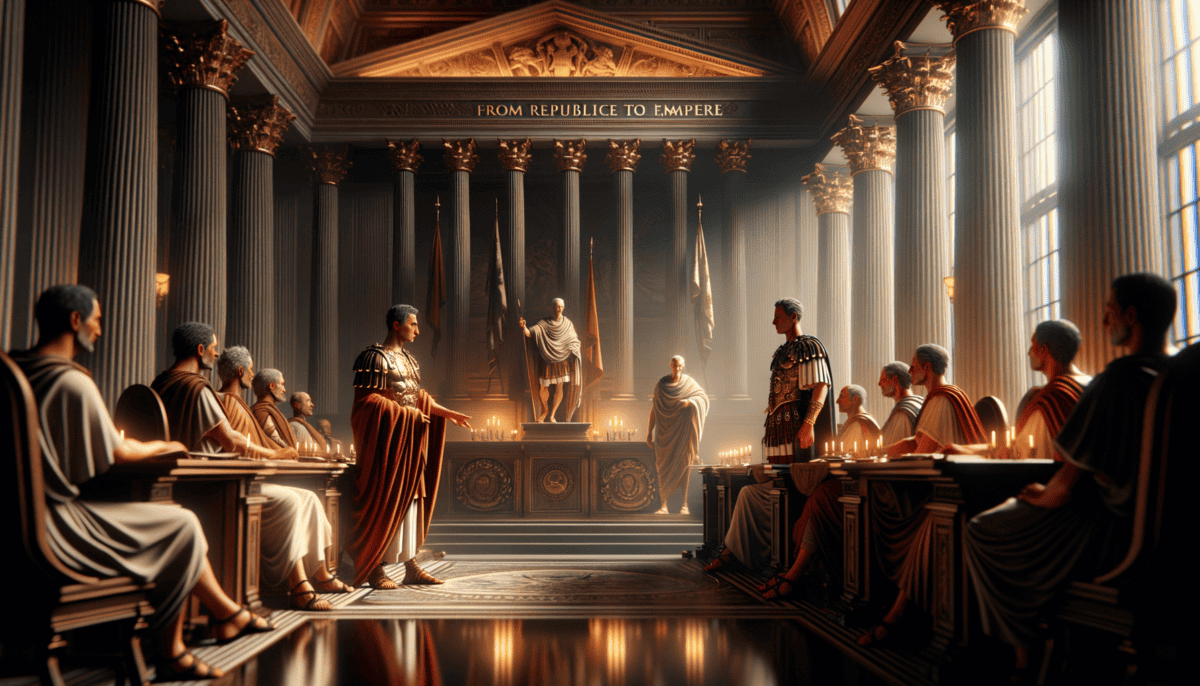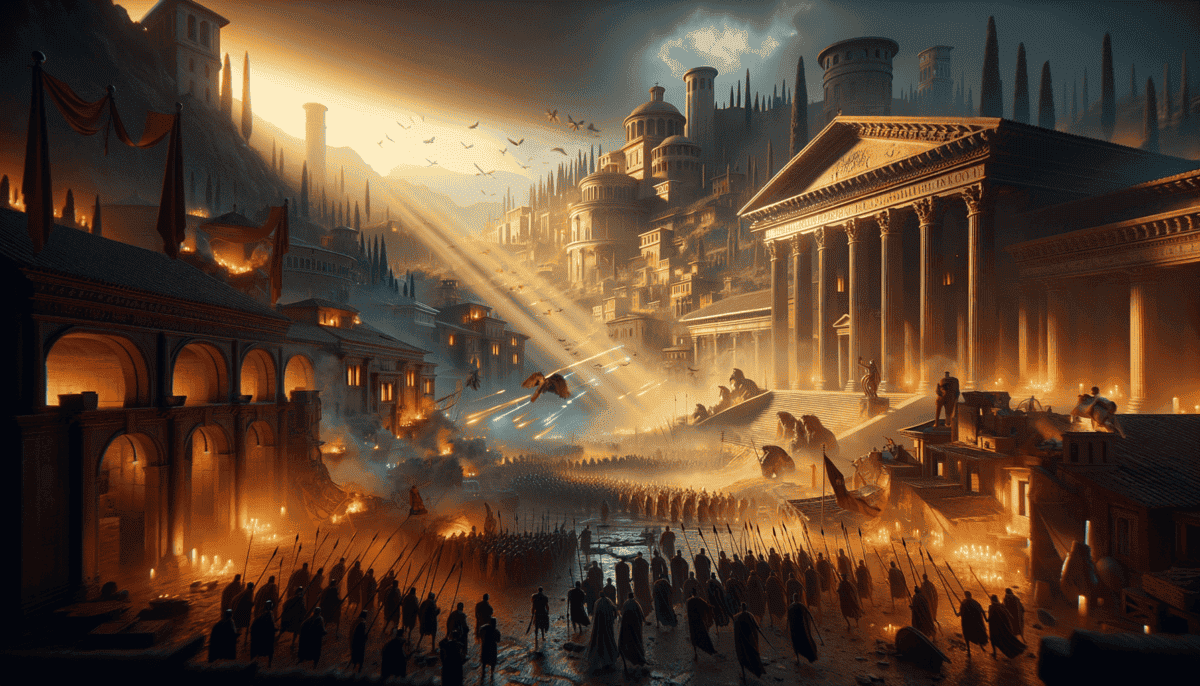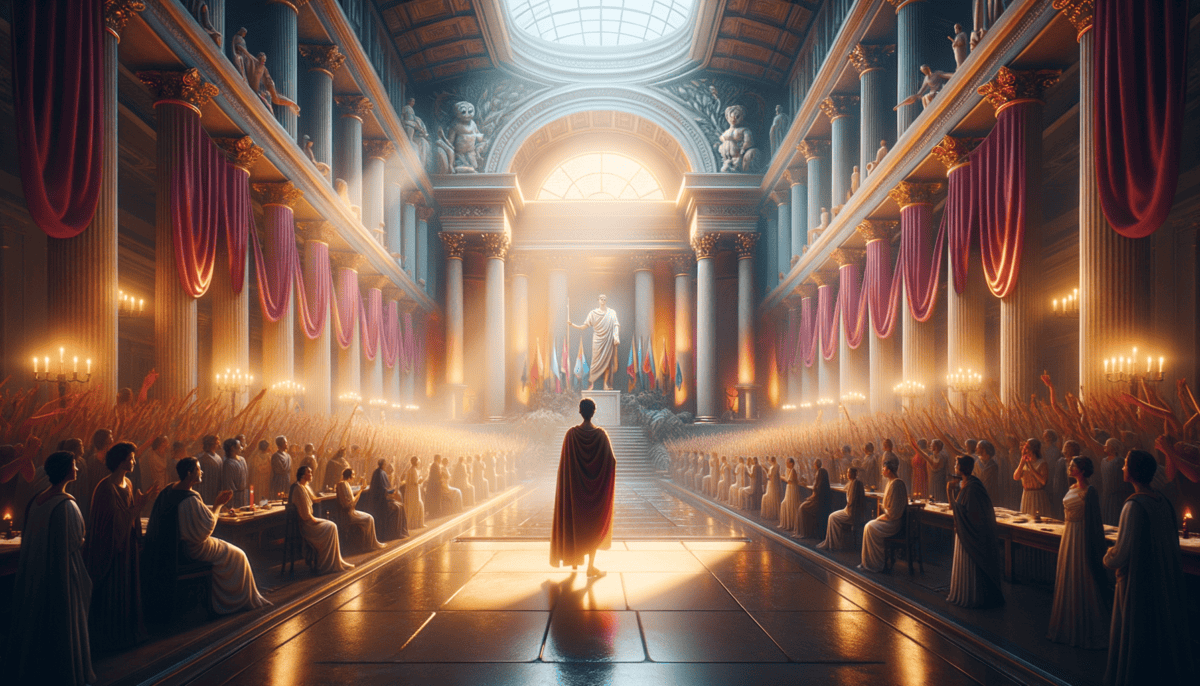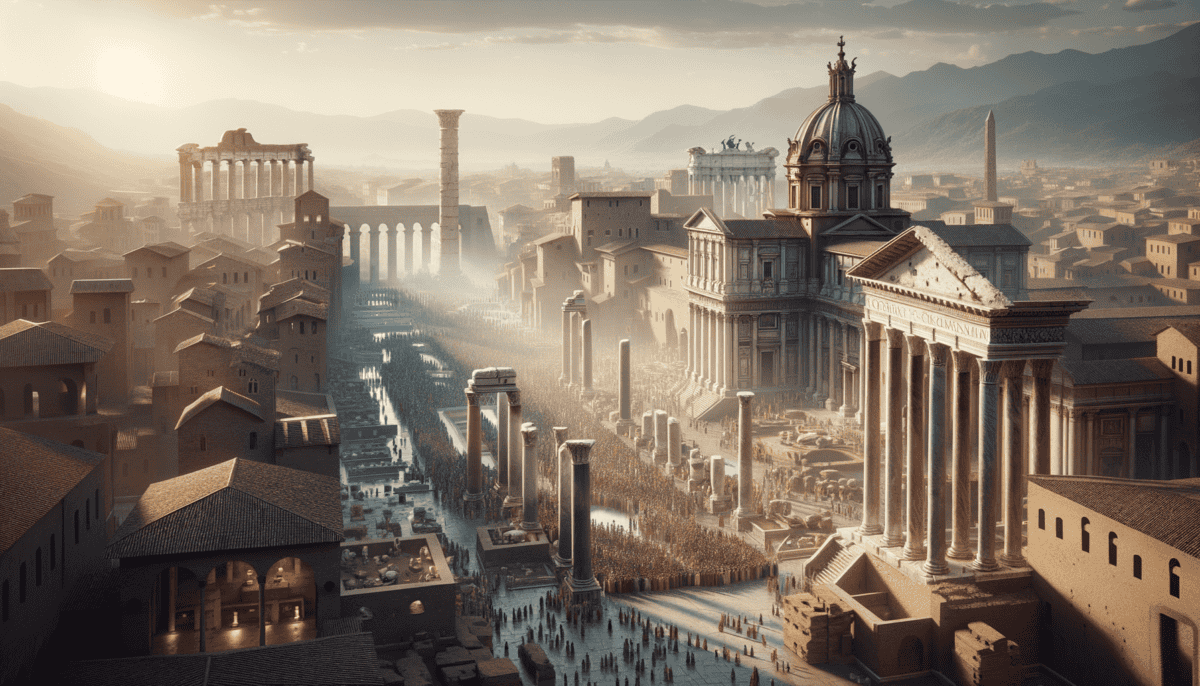The Seeds of Liberty
Marcus wiped sweat from his forehead as he ran through the bustling streets of Rome. The year was 509 BCE, and something big was happening. The people were gathering in the Forum, the city's main square.
"Hurry, Marcus!" called his father, Lucius. "Today we make history!"
The morning sun painted the white marble buildings in golden light. Marcus could smell fresh bread from the bakery and hear the excited chatter of people all around. Everyone was heading to the same place.
"Father, why is everyone so excited?" Marcus asked, dodging between the toga-wearing citizens rushing past.
Lucius smiled. "We're going to choose our own leaders today, son. No more kings telling us what to do. From now on, the people will have a voice!"
Marcus's eyes widened. "You mean we get to pick who's in charge?"
"That's right! We'll have a Senate – a group of wise citizens who will make decisions together. And we'll vote for two consuls to lead us each year."
A New Way of Leading
The Forum was packed with people. Marcus had never seen so many Romans in one place. He stood on his tiptoes to see better as important men in white togas with purple stripes took turns speaking.
"Citizens of Rome!" one man called out. "Today we build something new – a Republic where the people have power!"
The crowd cheered. Marcus didn't understand everything, but he could feel how important this was. His father explained that instead of one king making all the rules, different people would share power.
“Remember this day, Marcus,” Lucius said proudly. “We’re creating a government where citizens work together. Where your voice matters.”
Learning to Lead Together
Over the next few months, Marcus watched as Rome changed. People met often to vote and debate. His father took him to Senate meetings where they could watch the leaders discuss important things.
"But Father," Marcus asked one day, "what if people disagree?"
"That's the beauty of it, son. We talk, we listen, we find ways to work together. It's not always easy, but it's better than having one person make all the choices."
Marcus thought about this. He remembered how the old king would just tell everyone what to do. This new way seemed fairer, even if it took longer sometimes.
• Citizens could vote
• Leaders shared power
• People had rights
• Everyone followed the same laws
Sometimes Marcus would practice with his friends, pretending to be senators debating important issues like:
- Should they build a new temple?
- How many soldiers did they need?
- What should they do about the flooding in the river?
It wasn't always perfect. Sometimes people argued or couldn't agree. But Marcus learned that this was part of being free – having the right to speak up and help make decisions.
Growing Strong Together
As the seasons changed, Marcus saw how the new Republic made Rome stronger. More people wanted to participate. They felt proud to be citizens who could help make their city better.
"One day you'll be old enough to vote too," his father told him. "You'll help choose our leaders and make important decisions."
Marcus stood straighter, feeling important. He watched as new buildings went up, as traders came from far away, and as Rome grew bigger and stronger.
At night, he would look out his window at the city lights and think about how different things were now. The people were free to choose their path. They were building something new – together.
The sun was setting over the seven hills of Rome, painting the sky in beautiful colors. Marcus knew he was watching his city become something special. This was just the beginning of a great story – the story of the Roman Republic.
Rivals and Conquests
The waves crashed against the wooden ship as Marcus’s grandson, Titus, stood at attention. The year was 264 BCE, and Rome was about to face its biggest challenge yet – Carthage.
“Look alive, soldier!” Commander Duilius shouted. “Carthage’s ships are approaching!”
Titus had never seen anything like the Carthaginian ships. They were fast and sleek, while Roman ships were slower and heavier. But Rome had a secret weapon – the corvus, a special bridge that could grab enemy ships.
The First Big Fight
“Lower the corvus!” Commander Duilius ordered. The heavy wooden bridge crashed onto a Carthaginian ship, locking it in place. Roman soldiers rushed across, turning the sea battle into a land fight – something they were very good at.
“Remember what we’re fighting for,” his friend Lucius said. “For Rome, for our families, for our future!”
The battle was hard, but Rome won that day. It was their first big sea victory against Carthage, but not their last. The war would go on for many years.
Hannibal’s Big Surprise
Years later, Rome faced an even bigger challenge. Hannibal, Carthage’s clever leader, did something nobody expected – he brought war elephants across the mountains into Italy!
“How can we fight elephants?” young soldiers whispered nervously.
“With courage and smarts,” their commanders answered. They learned to scare the elephants with loud noises and sharp things, turning them back against Hannibal’s own army.
• How to build better ships
• New ways to fight
• The importance of never giving up
• How to defend their lands
Growing Stronger
Each battle taught Rome something new. They learned from their enemies and got better. When they lost, they didn’t give up – they tried harder.
“Look how far we’ve come,” Titus told his son one evening. “When I was young, Rome was just one city. Now we protect many lands and peoples.”
Rome was changing. They built new roads to move soldiers quickly. They made friends with other cities and learned new things from different cultures.
The Price of Victory
After many years of fighting, Rome finally beat Carthage. But winning came with big changes. Rome now controlled many lands far from home. They needed more soldiers and new ways to govern all these places.
“We’re not just protecting Rome anymore,” Titus explained to his grandchildren. “We’re protecting all the people who count on us now.”
Some things were harder with a bigger territory to protect. But Rome kept growing stronger. They built aqueducts to carry water, strong walls for defense, and roads to connect their lands.
A Changed World
As the sun set over Rome’s expanded territories, Titus thought about how much had changed. Rome was no longer just a city – it was becoming an empire. They had learned to build ships, fight elephants, and govern many different peoples.
The stars came out over the Mediterranean Sea, the same stars that had guided Roman ships in battle. Rome was bigger now, stronger. But new challenges were coming – challenges that would test not just their strength, but their very way of life.
Power and Ambition
The Forum buzzed with excitement as Julius Caesar rode through Rome’s crowded streets. The year was 59 BCE, and big changes were coming to Rome. ️
“Look at him,” whispered Marcus, a young messenger boy, to his friend. “They say he’s the most powerful man in Rome!”
Caesar smiled and waved at the cheering crowds. His red cape sparkled in the sun. But in the shadows, some senators watched with worried faces.
A New Kind of Leader
“The people love him too much,” grumbled Senator Cato to his friends. “He’s forgetting that Rome is supposed to be ruled by many, not just one.”
“But he helps the poor people,” Marcus’s mother said that evening. “He gives them food and work. That’s why they love him.”
Caesar did many good things. He built new buildings, gave jobs to poor people, and won many battles for Rome. But he also made some people nervous.
Big Changes
The old ways of Rome were changing. Before, many senators made decisions together. Now, powerful leaders like Caesar wanted to make more decisions by themselves.
• Leaders got more power
• The Senate got less power
• Poor people got more help
• The army became more important
Trouble in the Senate
“We must stop him!” some senators whispered in secret meetings. “He’s becoming too powerful!”
But others disagreed. “Rome needs a strong leader,” they said. “The old ways aren’t working anymore.”
Marcus watched as the grown-ups argued. He saw how Caesar’s soldiers loved him and would do anything for him. He noticed how the poor people cheered when Caesar gave them bread and games.
A City Divided
“Why can’t everyone just get along?” Marcus asked his father one night.
“Sometimes people have different ideas about what’s best for Rome,” his father explained. “That’s why we need to be careful about how much power we give to any one person.”
The streets of Rome felt different now. There was excitement, but also worry. Some people wore special pins to show they supported Caesar. Others refused to wear them.
Changes Coming
Caesar grew more powerful each day. He wrote new laws and led the army to win big battles. Some people started treating him like a king – something Rome hadn’t had for hundreds of years!
“But we got rid of kings long ago,” Marcus’s teacher reminded the class. “Rome is supposed to be free.”
The sun set over Rome’s seven hills, casting long shadows across the Forum. In homes and taverns, people wondered what would happen next. Would Rome stay a place where many people shared power? Or would it become something new?
As Marcus walked home that evening, he saw Caesar’s statue in the Forum. It seemed to grow taller each day, just like Caesar’s power. Big changes were coming to Rome – changes that would shape the future in ways no one could imagine.
War Comes to Rome
Dark clouds gathered over Rome as Caesar’s army approached the city. It was January 49 BCE, and everyone knew something big was about to happen. ⚔️
Marcus watched from the city walls with his father. “Why are there two armies?” he asked.
“Pompey leads one army, and Caesar leads the other,” his father explained. “They used to be friends, but now they’re fighting over who should rule Rome.”
A City Scared
People ran through the streets packing their things. Many were leaving Rome. Nobody wanted to be there when the armies met.
“Take only what you need,” Marcus’s mother said, filling a small bag. “We must be ready to move quickly.”
Even the senators were running away! Some went with Pompey, while others stayed to welcome Caesar. ♂️
Caesar Crosses the River
Caesar stood at the edge of a small river called the Rubicon. This river marked the border of Rome. By law, no general could cross it with an army.
“The die is cast!” Caesar said, and led his soldiers across. There was no turning back now.
• Caesar marched on Rome
• Pompey ran away to Greece
• Many battles were fought
• Friends and families split apart
Brothers Against Brothers
Marcus saw how the war split families apart. His uncle joined Pompey’s army, while his cousin fought for Caesar.
“Will they have to fight each other?” Marcus asked his mother.
“I pray they won’t,” she answered softly, wiping away a tear.
Battles Far Away
The fighting spread across many lands. Caesar chased Pompey to Greece, Egypt, and Africa.
“Caesar is winning everywhere!” people would say when news reached Rome.
But the cost was high. Many brave soldiers died on both sides. Fields were burned, and cities were destroyed.
Changes in Rome
Back in Rome, life was different. Caesar’s friends made all the important decisions now.
“Remember when the Senate used to meet every day?” Marcus heard an old man say. “Now they just do whatever Caesar wants.”
Some people were happy about this. “At least there’s peace in the city,” they said. But others missed the old ways. ️
The War Ends
After many battles, Caesar won. Pompey was dead, and his army was beaten.
“What happens now?” Marcus asked his father as they watched Caesar’s victory parade.
“Caesar rules Rome,” his father said quietly. “He has all the power now.”
The streets were full of celebration, but some people weren’t cheering. They worried about what would happen next.
A New Rome
The sun set on a changed Rome. The old way of sharing power was gone. Now one man made all the big choices.
Marcus looked at the victory banners flying over the Forum. He wondered if Rome would ever be the same again.
Some of Caesar’s enemies were still out there, watching and waiting. They had their own plans for Rome’s future. Big changes were still to come…
A New Dawn for Rome
The sun rose over Rome’s seven hills. A young boy named Felix watched as people gathered in the Forum. It was a special day in 27 BCE.
“What’s happening, Father?” Felix asked.
“Today, Augustus becomes our first emperor,” his father replied. “Everything will be different now.”
The Young Leader
Augustus was different from the old rulers. He didn’t wear a crown or call himself king. He was smart about how he got power.
• Keep the peace
• Make Rome beautiful
• Give people jobs
“Look how young he is!” Felix said, watching Augustus walk by.
“He may be young, but he knows how to make people happy,” his mother whispered. “He gives us bread and puts on big shows.”
Changes in the City
Rome started to look different. Augustus built new temples and fixed old ones. He said, “I found Rome in brick and left it in marble!” ️
Felix watched the builders at work every day. “The city is getting prettier,” he told his friends.
New roads made it easier to travel. Ships brought food from far away. People felt safe walking the streets.
The Senate’s New Role
The senators still met, but things were different now. They wore special purple stripes on their togas and looked important.
“Do they still make the rules?” Felix asked his father.
“They help Augustus make rules,” his father explained. “But he has the final say.”
Peace at Last
For the first time in many years, there was no fighting in Rome. People called it the “Roman Peace.” ☮️
• No more civil wars
• More food for everyone
• Better jobs
• Safer streets
A Growing Empire
Rome was getting bigger. New lands joined the empire. People from far away came to live in Rome.
“I have friends from Egypt and Greece now!” Felix told his mother excitedly.
“That’s because Rome welcomes everyone who follows our laws,” she smiled.
The Army Changes
Augustus made the army stronger. Soldiers got paid regularly and had good equipment.
“When I grow up, I want to be a soldier,” Felix said.
“Now soldiers protect the peace,” his father explained. “They don’t fight other Romans anymore.” ⚔️
A New Age Begins
As night fell over Rome, Felix sat with his family on their rooftop. The city glowed with lamplight.
“Is Rome better now?” he asked.
His father thought carefully. “It’s different. We have peace and plenty of food. But some people miss the old days when more people shared power.”
Felix looked at the stars above Rome. The empire was growing stronger every day, but more changes were coming. The story of Rome was far from over…
A Lasting Legacy
Marcus stood on a hill overlooking Rome in 117 CE. The city sparkled in the morning sun. It was bigger and more beautiful than ever before.
“Grandfather, tell me about the old days,” Marcus asked his elderly companion.
The Great City
“When I was your age,” Grandfather began, “Rome was much smaller. Now look at it! A million people live here.”
• The Colosseum for big shows
• Aqueducts bringing fresh water
• Beautiful temples
• Public baths for everyone
“How did we build all this?” Marcus asked in wonder.
“With new tools and clever ideas,” Grandfather smiled. “We learned to make concrete that’s stronger than stone!” ️
People From Everywhere
They walked through the busy marketplace. People spoke many different languages.
“In Rome, anyone can become successful,” a merchant called out. “I came from Syria, and now I have my own shop!”
Marcus saw children playing together. Some had dark skin, others light. Some wore Roman clothes, others dressed differently.
“Everyone brings something special to Rome,” Grandfather explained. “New foods, new ideas, new ways of doing things.”
Roads That Connect Everyone
“Look!” Marcus pointed to a map on the wall. “Our roads go everywhere!” ️
“Yes, we built roads all across the empire. They help people travel and trade. Some say all roads lead to Rome!”
Schools and Learning
They passed a school where children were learning. Some wrote on wax tablets. Others practiced speeches.
“Now more people can read and write than ever before,” Grandfather said proudly. “Knowledge spreads faster.”
Helping Everyone
Marcus saw poor people getting free bread. Sick people visited doctors at public hospitals.
“We take care of our people,” Grandfather explained. “A strong empire needs healthy citizens.”
Looking to the Future
As the sun set, Marcus and his grandfather watched workers light the street lamps.
“What will happen to Rome in the future?” Marcus asked.
“Rome will always be important,” Grandfather said. “The things we built, the laws we made, the stories we told – people will remember them forever.”
Marcus smiled. He was proud to be Roman. The empire had grown from a small city to rule much of the world. It wasn’t perfect, but it had changed history forever.
Even today, thousands of years later, we still use Roman ideas. We build with concrete, make laws like theirs, and tell their stories. The legacy of Rome lives on in many ways.
As stars appeared above the eternal city, Marcus knew he was part of something amazing – a story that would be told for countless generations to come. ⭐


